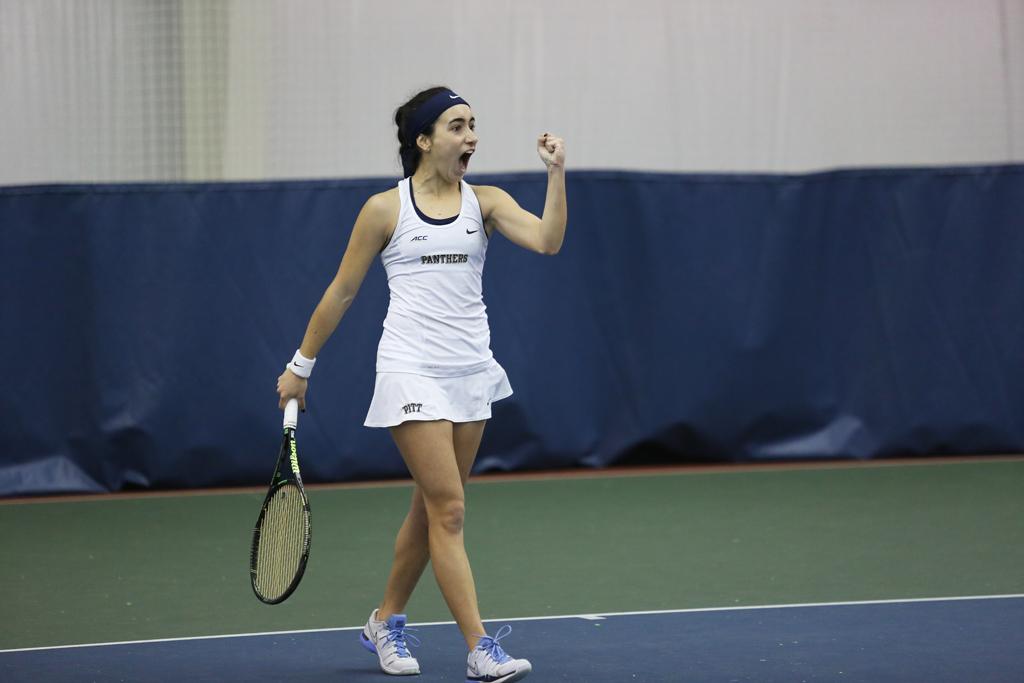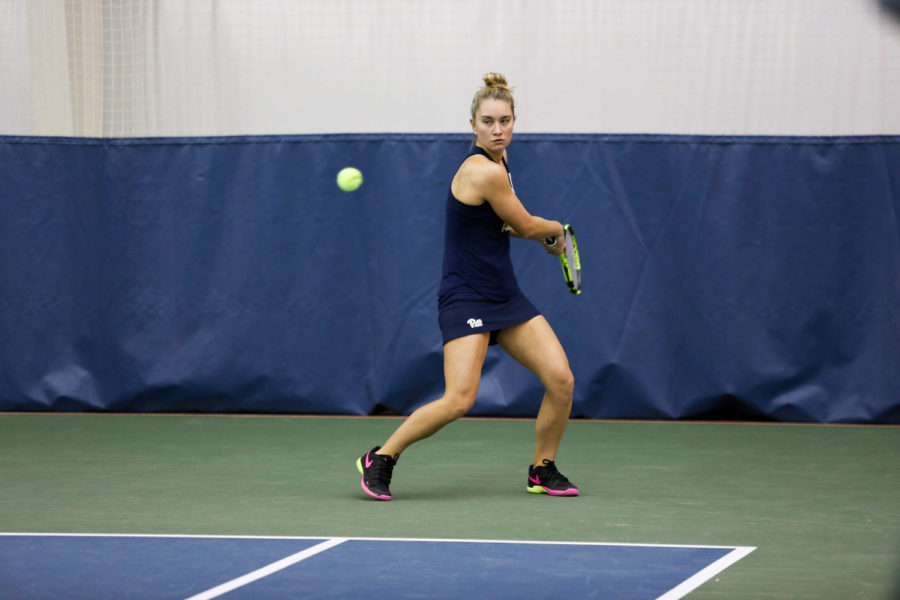A quick glance at the men’s top 10 world tennis rankings reveals that no two players share the same country of origin. The same can be said for the top eight women in the world — an unusual trend considering certain nations tend to specialize and often dominate in other sports.
A microcosm of the sport’s multiculturalism can be seen at Pitt as well, where senior Callie Frey is the only American-born player on the women’s tennis team.
“Last year, I was talking with my parents, and they pointed out that I would be the only American. And everyone was like, ‘How are you going to deal with that?’” Frey said. “But it’s just so cool to have so many different girls on the team from around the world, because I learn so much about their lifestyles that I had no idea about before.”
Frey, a Pittsburgh native, is also the lone senior on the Pitt women’s tennis team where almost every student hails from a different country — only junior Clara Lucas and first-year Claudia Bartolome share the same home nation, Spain. The eight-player team is represented by seven different countries and four different continents — Asia, Europe, North America and South America.
The team makeup marks a drastic difference from Frey’s first year at Pitt, when there was only one non-American player on the team— British then-sophomore Lolade Ogungbesan — and everybody spoke English as their first language.
Now in her final year, Frey has taken over a dual leadership role, helping acclimate new players to college life and American culture, according to head coach Alex Santos.
“[She explains] to them what it means to be at Pitt and how special it is, and how much love she has for this University and this City,” Santos, himself a Portugal native, said about Frey. “She definitely helps the others acquire that same passion.”
One of the biggest challenges in the adjustment process is the language barrier — with a team based on a multitude of international students, communication is key. Most players on the team do share a common language, although it isn’t English.

In addition to Lucas and Bartolome, Venezuelan junior Luisa Varon and Argentinian first-year Camila Moreno speak Spanish as their first language. Brazilian junior Gabriela Rezende and sophomore Cyprus-native Jovana Knezevic learned Spanish growing up, while Tokyo native Natsumi Okamoto had to learn the language while attending high school in Spain.
“I’m the only person who doesn’t speak Spanish on the team,” Frey said.
Frey took Spanish in high school but never had the same need for conversational Spanish as her teammates. That put her in a tough spot when the team took a trip to compete in Barcelona this past summer. It was Frey’s first time out of the country.
Santos said the team saw this as a chance to reciprocate some of the same assistance Frey gave, adding that they took it upon themselves to teach her to how to speak Spanish.
“I was teasing Callie [Frey] about how she was going to order food in Spain, and Claudia [Bartolome] said, ‘She’s been helping so much with adapting to Pitt and life in America that I have an obligation to help her adapt to life in Spain,’” Santos said.
Rezende said that the trip acted as a unifying experience for all members of the team.
“I think it was a really nice experience for Callie because she went to another country and she kind of experienced what we experienced here in America,” she said.
Rezende also reflected on her own adjustment that she encountered as a first-year student in the United States. It was difficult to adapt to cultural differences in language and food, she said, on top of the challenges she already faced as a young adult like managing her bank account and apartment hunting — all while living thousands of miles away from her family.
“But it was a great experience,” Rezende said. “When I came here during my freshman year, it was me and three other freshmen, so obviously I wasn’t alone, which helped me a lot.”
Rezende and those three other first-year students — Varon, Okamoto and Lucas, now all juniors — have progressed enough that now everyone on the team can speak English well.
And despite the differences in native tongue, one language is common to every player on the team — tennis. All cultural differences subside on the court, where the collective passion for the game breaks down any barriers for both the player and coach.
“I think the most important thing in managing people is respect. Respect and a common goal,” Santos said. “No matter where you’re from, if I respect you and you respect me, and if we have the common goal to get better, then everything can run smoothly from there.”


